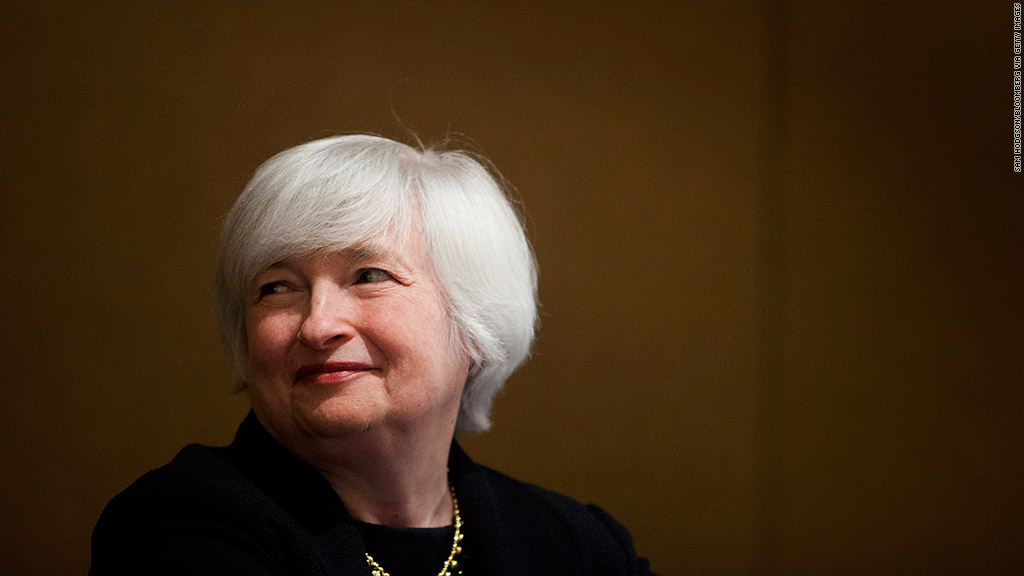
A contentious debate is brewing among Federal Reserve watchers about who should lead the central bank after Ben Bernanke.
Up until this week, Janet Yellen -- Bernanke's second in command -- was thought to be the frontrunner.
Now, former Treasury Secretary Larry Summers is also getting a lot of attention as a strong candidate.
The differences between the two candidates are staggering. On one side, Yellen is a well-regarded economist known for leaning dovish on monetary policy and leading the Fed's push for more transparency. She brings a robust résumé filled with Federal Reserve experience, but has largely kept out of the public eye.
In the other corner is Summers, who under President Clinton, championed deregulation for Wall Street and under President Obama, was one of the architects of the fiscal stimulus package. Unlike Yellen, he is known as an aggressive personality, who often finds himself in the spotlight.
Yellen, 66, has a Yale economics Ph.D. and a 40-year career to her name, including about 13 years of experience in various Federal Reserve roles, a 2-year stint as the chairwoman of President Clinton's Council of Economic Advisers, and academic experience at the University of California, Berkeley.
On monetary policy, Yellen represents more of the same from the Fed since her views seem closely aligned with Bernanke's. Economists expect she would probably continue the central bank's efforts to stimulate the job market back to full employment, even if it means continuing the Fed's controversial bond-buying program.
Summers, 58, has a Harvard Ph.D. and is regarded as a brilliant economist, but his views on monetary policy are less well known. His experience lies mostly on the fiscal policy side.
He held several major roles in the Clinton administration, culminating as Treasury secretary. During that time, he championed legislation that repealed parts of the Glass-Steagall Act and made it possible for financial institutions to become larger than ever before, simultaneously acting as investment banks, commercial banks and insurance companies.
He also pushed back against efforts to regulate highly complex derivatives. Those two pro-Wall Street moves are now thought of as key contributors to the 2008 financial crisis.
Summers later served as president of Harvard University, and then as head of President Obama's National Economic Council, where he helped engineer the stimulus package and the auto bailout.
Related: Sheila Bair on 'Why Janet Yellen should succeed Ben Bernanke'
While Summers is famous for being bold and provocative, Yellen has the opposite reputation.
To say Summers is better known by the broader public is an understatement. He's known not only for his high level roles as Treasury secretary and Harvard president, but also for his controversial comments about women, a dramatized portrayal in The Social Network and high praise from Facebook COO Sheryl Sandberg, who once worked for him and mentioned him often in her best-selling book, Lean In.
In comparison, Yellen flies under the radar. Her speeches are often deep, meticulously worded and robust with academic research, but rarely exciting enough to make front page headlines.
But to criticize her as "soft-spoken," isn't entirely fair either.
Internal Fed transcripts show that Yellen spoke up many times between 2005 and 2007, to warn her colleagues about the looming housing crisis, credit crunch, and eventual recession. At that point, other smart people at the table were still largely shrugging off those concerns.
That foresight also contrasts with Summers, who in 2005, rebuffed claims that deregulation and securitization could lead to a full-blown financial crisis.
Poll: Who do you think should be the next chair of the Federal Reserve?
Summers made another infamous gaffe that same year. He caused an uproar at Harvard, when as president of the university, he said that "issues of intrinsic aptitude," may explain why men outnumber women in science and engineering jobs.
While he apologized repeatedly for the comments, that wasn't enough to save him from outrage that ensued. The comments have haunted his reputation ever since, even leading Sandberg to pen this Huffington Post column in his defense, in 2008.
"Many people note that our nation has few economists with his intelligence," she wrote. "They should also know that we have few leaders, if any, in the financial world who have done more for women."
Summers later served on the White House Council on Women and Girls, from 2009-2010.
If appointed, Yellen would be the first female head of the Federal Reserve in its 100-year history -- a key appointment at a time when only about a third of President Obama's second-term cabinet members are women.
Plus, central banking largely remains an old boys' club worldwide.
Earlier this year, I asked Yellen about why more women aren't rising in the field, to which she replied:
"I am pleased that the representation of women is increasing a lot at other levels, at lower levels of central banking, and in the financial markets, and in institutions more broadly."
"I really think this is something that's going to increase over time, and it's time for that to happen."


